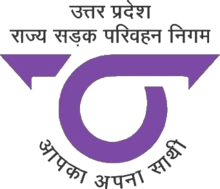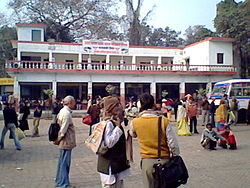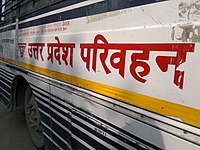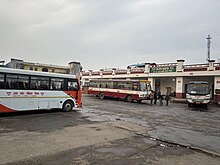Uttar Pradesh State Road Transport Corporation
| Uttar Pradesh State Road Transport Corporation | |
|---|---|
 | |
| Overview | |
| Owner | Department of Transport (Government of Uttar Pradesh) |
| Area served | Uttar Pradesh, Uttarakhand, Delhi, Bihar, Rajasthan, Punjab, Himachal Pradesh, Haryana, Jammu and Kashmir, Madhya Pradesh |
| Locale | Uttar Pradesh |
| Transit type | Interstate Bus Intercity Bus City Bus |
| Daily ridership | 18 Lakhs |
| Website | UPSRTC |
| Operation | |
| Began operation | 15 May 1947 |
The Uttar Pradesh State Road Transport Corporation (UPSRTC) is a public sector passenger road transport corporation which services Uttar Pradesh, India, and adjoining states of North India.[4] It operates as a state and interstate bus service and has the largest fleet of buses in North India. UPSRTC is the government-owned transport corporation and its corporate office of the corporation is located at MG Marg in Lucknow.[5]
History
[edit]
Passenger road transport services in the state of U.P. started on 15th May, 1947 with the operation of bus service on the Lucknow - Barabanki route by the erstwhile U.P. Government Roadways. During the 4th five-year plan, the erstwhile UP Government Roadways was renamed as Uttar Pradesh State Road Transport Corporation (UPSRTC) on 1 June 1972 under the provisions of the Road Transport Act, 1950. The objectives of this undertaking were –
- The development of the road transport sector correlated to which would lead to the overall development of trade & industry.
- The coordination of the road transport services with other modes of transport.
- To provide an adequate, economical & efficiently coordinated road transport service to the residents of the state.
Organizational setup
[edit]The Board of Directors, headed by the Chairperson, manage the Corporation through its Managing Director, who is its executive head. The current M.D. of UPSRTC is Shri Masoom Ali Sarwar, while the current Chairman is Shri Lakko Venkateshwarlu.[6][7]
Infrastructure
[edit]

The corporation has been divided into 20 regions for efficient functioning, of which 1 region operates urban and suburban services.[8] Each region has a regional workshop, where major repair and maintenance, as well as assembly and reconditioning, is performed. Each region has been further divided into operational units called depots, of which there are 115, including Car-Section. Each depot has a depot workshop attached to it to provide supportive maintenance facilities. The locations of the depots are as follows:[8]
| S. No. | Region | No. of Depots[9] |
|---|---|---|
| 1 | Agra | 6 |
| 2 | Aligarh | 7 |
| 3 | Ayodhya | 4 |
| 4 | Azamgarh | 7 |
| 5 | Bareilly | 4 |
| 6 | Chitrakoot | 4 |
| 7 | Devipatan | 3 |
| 8 | Etawah | 6 |
| 9 | Ghaziabad | 8 |
| 10 | Gorakhpur | 8 |
| 11 | Hardoi | 6 |
| 12 | Jhansi | 2 |
| 13 | Kanpur | 6 |
| 14 | Lucknow | 7 |
| 15 | Meerut | 5 |
| 16 | Moradabad | 8 |
| 17 | Noida | 2 |
| 18 | Prayagraj | 8 |
| 19 | Saharanpur | 6 |
| 20 | Varanasi | 8 |
For heavy maintenance and repair of vehicles, reconditioning of major assemblies, renovation of buses and construction of bodies on new chassis, two Central workshops have been established in Kanpur: Central Workshop, Rawatpur and Dr Ram Manohar Lohia Workshop, Allen Forest. Eight tyre re-treading plants are established at Agra, Lucknow, Gorakhpur, Ayodhya, Ghaziabad, Bareilly, Kanpur, Saharanpur, Prayagraj, Moradabad and Etawah to provide in-house tyre re-treading facilities. For repairs and maintenance of staff cars belonging to the State Government and the corporation, a separate unit named Car-Section is established in Lucknow. For imparting training to drivers and technical staff, a Training School is established in Kanpur.The state transport department is also an introducing Intelligent Transport Management System (ITMS) with a cost of Rs 38.28 crore of which 50 percent will be a grant from Government of India and the remaining 50 percent would come from private participation. With the implementation of ITMS, the entire transport department in the state would go online. UPSRTC had its own ISBT located at Lucknow.[citation needed]
Bus stations
[edit]
The corporation has 300 bus stations of which 249 are in owned premises and 51 are in rented premises. For the convenience of passengers, the Corporation generally has restrooms, canteens, booking offices, toilets, drinking water facilities, timetables, chart displays, enquiry counters, public address systems, lights, fans, seats, benches etc at all its stations.[10]
Fleet
[edit]UPSRTC has a total fleet of 12,490 buses.[11] Its buses operate over 3.51 million kilometers at 3142 routes catering to the travel needs of over 1.80 million people and earning over Rs.137.70 million every day.


Network
[edit]UPSRTC has the largest bus fleet in North India and operates interstate buses to eight neighboring states, viz., Uttarakhand, Delhi, Bihar, Chandigarh, Rajasthan, Punjab, Himachal Pradesh, Haryana, Jammu and Kashmir and Madhya Pradesh. There is a good network of interstate buses with an influx of passengers from proximate states. Its furthest places of operations in each direction are very far away. The northernmost point of operation is Katra, Jammu and Kashmir, the southernmost point is Indore, the easternmost point is Patna, while the westernmost point is Ajmer. Till these points, UPSRTC operates its regular bus services for passengers.[citation needed]

Types of buses
[edit]- LOHIA GRAMIN SEWA
Operates as shuttle service between district headquarters and nearby towns/villages/tehsils. Caters to rural and economy-conscious traffic. USP – Reduced fares (around 70% of fare of ordinary services) are charged.
- MINI
Operates as shuttle service between district headquarters and nearby towns/villages/tehsils. Caters to rural and time-conscious traffic. USP – Since it has 32 seats, gets filled up fast and reaches destination faster.
- ORDINARY
New comfortable buses operate between various districts. Caters to the general traffic. USP – Ordinary fares are charged.
- SUHANI SEWA
These buses have fixed stops & fixed time table and known for their punctuality and service.
- SANKALP SEWA
The bus service will connect interior areas with big cities, these public buses are in saffron colour.
- SLEEPER
New, comfortable, and AC non-AC Sleeper services for long routes. Operates between different long-distance destinations. USP – Has 28 seats on the lower tier and 15 berths on the upper tier.
- JANRATH
New, the low-cost AC bus service, very comfortable, AC and point to point services. Operates between different districts as direct services. The idea behind introducing these AC buses with reasonable fare is to make it affordable for low-income class people poor to enjoy this luxury without putting any burden on their pockets
- VOLVO
Spacious and comfortable 2*2 A/c Volvo buses for ease and comfort during the journey. 45 seater, spacious, state of the art Volvo buses with great comfort services between all districts, headquarters, and major routes.
- CITY BUS SERVICE
Operates CNG city buses under JNNURM in Agra, Kanpur, Lucknow, Mathura, Ghaziabad, Noida, Greater Noida.[12]
Awards and achievements
[edit]The Uttar Pradesh State Road Transport Corporation (UPSRTC) achieved a magnificent feat by setting a Guinness Book of World Records for the largest parade of buses anywhere in the world. As many as 500 special Kumbh Mela buses were paraded for this purpose in the city of Prayagraj in Uttar Pradesh. The fleet of 500 buses was paraded on a stretch of 3.2 kilometres. Observers from the Guinness Book of World Records were present at the scene and handed over the certificate.[13] UPSRTC is going to give free travel of 4000 kilometer every year through smart card to such teachers working in the state who are honored with national or state award.[14]
References
[edit]- ^ "Selection of Authorized Agent for Operating Courier & Parcel Services Through Buses of UPSRTC - Annexure 1 (Details of Buses Region-wise)" (PDF). upsrtc.up.gov.in. UPSRTC. 28 April 2022. p. 17. Retrieved 15 November 2023.
- ^ https://www.goibibo.com/bus/upsrtc-uttar-pradesh-state-road-transport-corporation-bus-booking/.
{{cite web}}: Missing or empty|title=(help) - ^ "UPSRTC - Data 2020" (PDF). upsrtc.com. UPSRTC. Retrieved 19 March 2022.
- ^ "About Us – About the Corporation". upsrtc.com. Uttar Pradesh State Road Transport Corporation. Retrieved 19 March 2022.
- ^ "About Us – About the Corporation". upsrtc.com. Uttar Pradesh State Road Transport Corporation. Retrieved 19 March 2022.
- ^ "About us - Management Details". upsrtc.up.gov.in. Uttar Pradesh State Road Transport Corporation. Retrieved 30 November 2023.
- ^ "About us - Organisation Structure". upsrtc.up.gov.in. Uttar Pradesh State Road Transport Corporation. Retrieved 19 March 2022.
- ^ a b "About us - History & Background and Infrastructure". UPSRTC Official Site. Retrieved 19 March 2022.
- ^ "List of bus stations established in owned and rented premises". UPSRTC. Retrieved 24 August 2024.
- ^ "UPSRTC Bus Stations". UPSRTC. Archived from the original on 21 June 2021. Retrieved 7 May 2021.
- ^ "UPSRTC - Data 2020" (PDF). upsrtc.com. UPSRTC. Retrieved 19 March 2022.
- ^ "UP govt to launch Lohia bus service in cities". United News of India. 16 January 2016. Retrieved 10 February 2019.
- ^ "Uttar Pradesh sets new Guinness world record: 500 Kumbh Mela-special buses paraded on 3.2-km stretch". First Post.
- ^ "UP Free Bus Smart Card Teachers: Yogi government's new initiative, now government teachers will travel free in UPSRTC buses". Yugantar Pravah. 8 April 2023.
